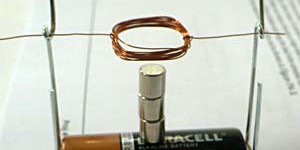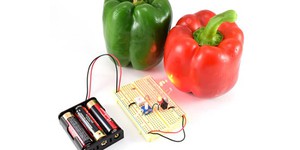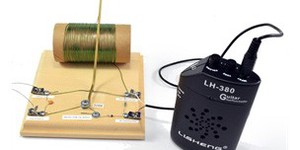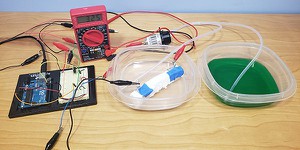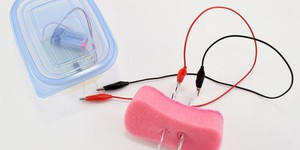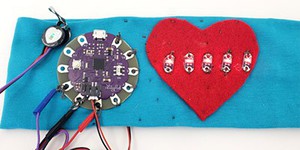Electricity & Electronics Science Projects (75 results)
Stop for a minute and try to imagine your world without electrical power and electronic gadgets.
No convenient appliances in the kitchen, no electric lights. No computers, MP3 players, television, or video games.
Your life would be completely different, wouldn't it? Electricity and electronics are so central to modern life that, paradoxically, they're easy to overlook.
|
Select a resource
Sort by
|
When you think of a motor, you may immediately think of a car, but you actually encounter other motors in your home every day. That's right, if you put on clean clothes from the washing machine, ate food from the fridge, or used a fan, you used an electric motor. In this electronics science project, you will make a simple electric motor with two magnets that "talk" to each other. As they interact, they will alternate between "liking" each other (pulling together), and "disliking" each other…
Read more
Remembering to take medicine at the right time can be hard, especially if you need to take multiple medications at different times of day. It might not be a big deal if you forget to take your daily multivitamin, but for some people, forgetting to take medication at the right time can be dangerous. What if you had a device that could not only set off an alarm at the right time, but also automatically dispense the right pills for you? In this project, you will build an automatic medicine…
Read more
New
Artificial intelligence (AI) programs can now generate photorealistic pictures of people who do not exist in the real world. How can you tell if a picture is of a real person or a fake, AI-generated person? What features of the picture do people use to decide whether the face is real or AI-generated? In this project, you will explore these questions as you ask volunteers to look at both real and AI-generated pictures of human faces.
Read more
Do you want to trick friends and visitors with an amazing optical illusion? In this engineering design project you will learn how to build an infinity mirror,with built-in lights that make the mirror look like a deep tunnel with no end. But pick the mirror up and look behind it, and you will see that it is only a couple of inches thick! Read this project to find out not only how this illusion works, but how to design and build your very own infinity mirror from scratch.
Read more
You may be familiar with permanent magnets—the kind that hang on a refrigerator. But did you know that other magnets, called electromagnets, can be turned on and off? When turned on, electromagnets act just like permanent magnets, but if you turn them off, their magnetic properties disappear. Electromagnets are an important part of many electronic devices, like motors, loudspeakers, and hard drives. You can create an electromagnet with a simple coil of wire and a battery. In this project,…
Read more
When you go to the supermarket, how do you pick out ripe fruits and vegetables? You might look at their size or color, or feel them for firmness. That might be easy to do when you pick out a half dozen apples, but imagine if you had to examine thousands of apples growing in a field, or strawberries coming down a conveyor belt getting ready for packaging. Suddenly, it is a lot harder to do yourself! What if a machine could pick and sort the produce for you? In this project, you will address part…
Read more
New
Does your dog get bored when you are not home? Do you ever toss them a few treats right before you head out the door? What if you could keep them busy by automatically dispensing treats throughout the day? What about training them to sit in a certain place or even press a button by automatically rewarding them with treats? In this project you will build your own automatic dog (or cat, or other pet) treat dispenser that you can customize to react to different sensors.
Read more
Have you ever wondered how a radio can grab signals that are transmitted through the air and convert them into sound? In this science project, you will build your own AM radio receiver from scratch and use it to listen to AM radio broadcasts. With your crystal radio you will be able to experiment with the circuit and the antenna to get the best reception.
Read more
"Alexa, turn on the lights!" Sometimes it is easy to take the technology around us for granted. But have you ever wondered how a smart speaker like an Amazon Echo® knows what you are saying and how it can control lights and appliances in your home? It can seem like magic if you buy a device that just works when you open the box. In this project, you will learn how it works. You will build your own smart home device to control an appliance with voice commands using an Arduino®. Get…
Read more
Imagine if you had to take medicine every time you ate, and you had to use a math formula to figure out how much medicine to take based on the nutritional makeup of the food, how you were feeling, and what activities you were planning to do. You might also need extra medicine throughout the day (even in the middle of the night) based on your blood glucose levels. People with diabetes who take insulin do this every day. They use finger sticks and blood glucose meters or a continuous glucose…
Read more
Water is a valuable resource, and water shortages are a serious problem in many parts of the world. The problem can be made worse by people who waste water; for example, by watering a garden or using sprinklers on their lawn (or a farmer taking care of an entire field) when it has rained recently or the soil is already moist. How can you help conserve water and prevent such waste? One way is to build an electronic soil moisture sensor. This project will show you how to build a circuit that…
Read more
People have a variety of reasons to use heart rate monitors. For example, patients in a hospital might have stationary, bedside equipment monitor their heart rate and alert medical staff in case of an emergency. Somebody going for a run might wear a portable heart rate monitor to keep track of their workout intensity. Heart rate monitors are not all the same—their appearance and function will vary depending on the intended use. In this project you will design, build, and program your own…
Read more
|
Explore Our Science Videos
Volleyball Machine: 2019 Engineering Challenge
Colorful Melting Ice Ball Patterns - STEM Activity
Write and Read Braille – STEM activity



